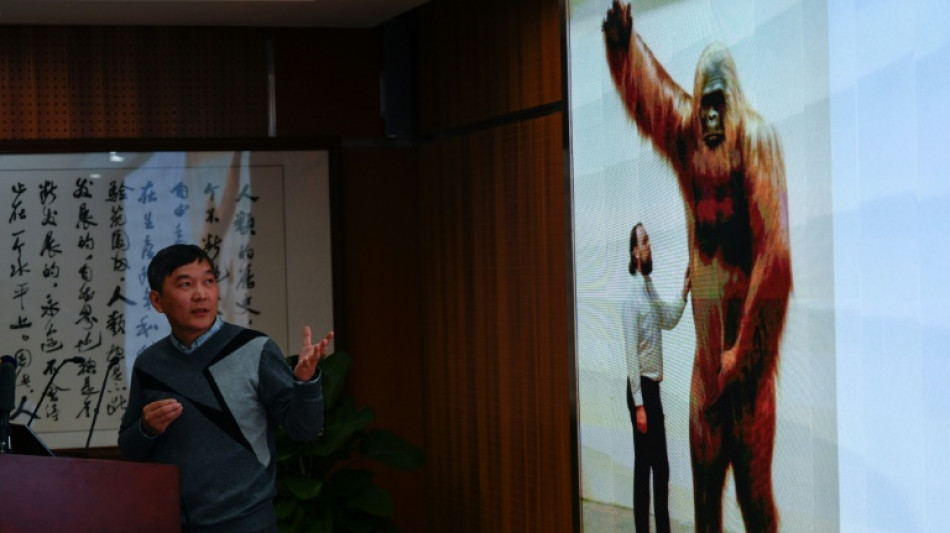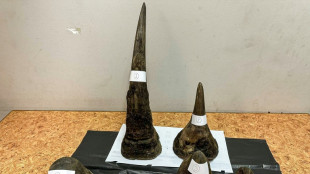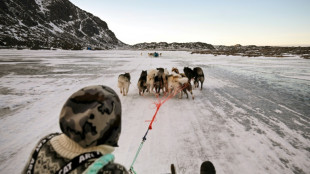
-
 Back to black: Philips posts first annual profit since 2021
Back to black: Philips posts first annual profit since 2021
-
South Korea police raid spy agency over drone flight into North

-
 'Good sense' hailed as blockbuster Pakistan-India match to go ahead
'Good sense' hailed as blockbuster Pakistan-India match to go ahead
-
Man arrested in Thailand for smuggling rhino horn inside meat

-
 Man City eye Premier League title twist as pressure mounts on Frank and Howe
Man City eye Premier League title twist as pressure mounts on Frank and Howe
-
South Korea police raid spy agency over drone flights into North

-
 Solar, wind capacity growth slowed last year, analysis shows
Solar, wind capacity growth slowed last year, analysis shows
-
'Family and intimacy under pressure' at Berlin film festival

-
 Basket-brawl as five ejected in Pistons-Hornets clash
Basket-brawl as five ejected in Pistons-Hornets clash
-
January was fifth hottest on record despite cold snap: EU monitor

-
 Asian markets extend gains as Tokyo enjoys another record day
Asian markets extend gains as Tokyo enjoys another record day
-
Warming climate threatens Greenland's ancestral way of life

-
 Japan election results confirm super-majority for Takaichi's party
Japan election results confirm super-majority for Takaichi's party
-
Unions rip American Airlines CEO on performance

-
 New York seeks rights for beloved but illegal 'bodega cats'
New York seeks rights for beloved but illegal 'bodega cats'
-
Blades of fury: Japan protests over 'rough' Olympic podium

-
 Zelensky defends Ukrainian athlete's helmet at Games after IOC ban
Zelensky defends Ukrainian athlete's helmet at Games after IOC ban
-
Jury told that Meta, Google 'engineered addiction' at landmark US trial

-
 Despite Trump, Bad Bunny reflects importance of Latinos in US politics
Despite Trump, Bad Bunny reflects importance of Latinos in US politics
-
Star Copper to Deploy Advanced Deep-Penetrating 3D IP to Expedite 2026 Drill Program

-
 Apex Mobilizes Second Drill Rig and Provides Phase I Update at the Rift Rare Earth Project in Nebraska, U.S.A.
Apex Mobilizes Second Drill Rig and Provides Phase I Update at the Rift Rare Earth Project in Nebraska, U.S.A.
-
Noram Fully Funded for 2026 and Engages GRE to Update PEA With Multiple High-Value Critical Mineral Byproduct Credits

-
 Gaming Realms PLC Announces FY25 Pre-Close Trading Update
Gaming Realms PLC Announces FY25 Pre-Close Trading Update
-
Caledonia Mining Corporation Plc - Issue of Securities Pursuant to Long Term Incentive Plan Awards

-
 Hemogenyx Pharmaceuticals PLC Announces Issue of Equity
Hemogenyx Pharmaceuticals PLC Announces Issue of Equity
-
How Fort Myers Dentists Create Long-Term Care Plans for Healthy Smiles

-
 Nikon Introduces the ACTION and ACTION ZOOM Binoculars
Nikon Introduces the ACTION and ACTION ZOOM Binoculars
-
Australian PM 'devastated' by violence at rally against Israel president's visit

-
 Vonn says suffered complex leg break in Olympics crash, has 'no regrets'
Vonn says suffered complex leg break in Olympics crash, has 'no regrets'
-
YouTube star MrBeast buys youth-focused banking app

-
 French take surprise led over Americans in Olympic ice dancing
French take surprise led over Americans in Olympic ice dancing
-
Lindsey Vonn says has 'complex tibia fracture' from Olympics crash

-
 US news anchor says 'hour of desperation' in search for missing mother
US news anchor says 'hour of desperation' in search for missing mother
-
Malen double lifts Roma level with Juventus

-
 'Schitt's Creek' star Catherine O'Hara died of blood clot in lung: death certificate
'Schitt's Creek' star Catherine O'Hara died of blood clot in lung: death certificate
-
'Best day of my life': Raimund soars to German Olympic ski jump gold

-
 US Justice Dept opens unredacted Epstein files to lawmakers
US Justice Dept opens unredacted Epstein files to lawmakers
-
Epstein taints European governments and royalty, US corporate elite

-
 Three missing employees of Canadian miner found dead in Mexico
Three missing employees of Canadian miner found dead in Mexico
-
Meta, Google face jury in landmark US addiction trial

-
 Winter Olympics organisers investigate reports of damaged medals
Winter Olympics organisers investigate reports of damaged medals
-
Venezuela opposition figure freed, then rearrested after calling for elections

-
 Japan's Murase clinches Olympic big air gold as Gasser is toppled
Japan's Murase clinches Olympic big air gold as Gasser is toppled
-
US athletes using Winter Olympics to express Trump criticism

-
 Japan's Murase clinches Olympic big air gold
Japan's Murase clinches Olympic big air gold
-
Pakistan to play India at T20 World Cup after boycott called off

-
 Emergency measures hobble Cuba as fuel supplies dwindle under US pressure
Emergency measures hobble Cuba as fuel supplies dwindle under US pressure
-
UK king voices 'concern' as police probe ex-prince Andrew over Epstein

-
 Spanish NGO says govt flouting own Franco memory law
Spanish NGO says govt flouting own Franco memory law
-
What next for Vonn after painful end to Olympic dream?


Late apes: Biggest primate ever died off due to 'huge mistake'
The largest primate ever to walk the Earth went extinct because it could not adapt to its changing environment, with the mighty beast reduced to living off bark and twigs before dying off, scientists said on Wednesday.
Gigantopithecus blacki, which stood three metres tall (10 feet) and weighed up to 300 kilogrammes (660 pounds), thrived in the forests of southern Asia until a little more than 200,000 years ago.
Exactly why the great ape died off after flourishing for hundreds of thousands of years has been one of the lasting mysteries of palaeontology ever since a German scientist first stumbled on one of its teeth at a Hong Kong apothecary in the 1930s.
The molar was so massive it was being sold as a "dragon's tooth".
"It was three to four times bigger than the teeth from any great ape," Renaud Joannes-Boyau, a researcher at Australia's Southern Cross University, told AFP.
"That intrigued him and that's where all this research started," said Joannes-Boyau, a co-author of a new study in the journal Nature.
All that has been found of the Gigantopithecus since are four partial jawbones and around 2,000 teeth, hundreds of which were discovered inside caves in southern China's Guangxi province.
Even after a decade of excavations in these caves, the cause of the ape's extinction remained elusive, said the study's co-lead author Yingqi Zhang of China's Institute of Vertebrate Palaeontology and Palaeoanthropology.
- Huge apes can't jump -
Seeking to establish a timeline of the animal's existence, the team of Chinese, Australian and US scientists collected fossilised teeth from 22 caves.
The team used six different techniques to determine the age of the fossils, including a relatively new method called luminescence dating which measures the last time minerals were exposed to sunlight.
The oldest teeth dated back more than two million years, while the most recent were from around 250,000 ago.
Now the researchers can tell "the complete story about Gigantopithecus's extinction" for the first time, Zhang told AFP in his office in Beijing.
They established that the animal's "extinction window" was between 215,000 and 295,000 years ago, significantly earlier than previously thought.
During this time, the seasons were becoming more pronounced, which was changing the local environment.
The thick, lush forest that Gigantopithecus had thrived in was starting to give way to more open forests and grassland.
This increasingly deprived the ape of its favourite food: fruit.
The huge animal was bound to the ground, unable swing into the trees for higher food.
Instead, it "relied on less nutritious fall-back food such as bark and twigs," said Kira Westaway, a geochronologist at Australia's Macquarie University and co-lead author.
Zhang said this was a "huge mistake" which ultimately led to the animal's extinction.
- Clever relative -
The primate's size made it difficult to go very far to search for food -- and its massive bulk meant that it needed plenty to eat.
Despite these challenges, "surprisingly G. blacki even increased in size during this time," Westaway said.
By analysing its teeth, the researchers were able to measure the increasing stress the ape was under as its numbers shrunk.
They also compared Gigantopithecus' fate to its orangutan relative, Pongo weidenreichi, which handled the changing environment far better.
The orangutan was smaller and more agile, able to move swiftly through the forest canopy to gather a variety of food such as leaves, flowers, nuts, seeds, and even insects and small mammals.
It became even smaller over time, thriving as its massive cousin Gigantopithecus starved.
Westaway emphasised that it was important to understand the fate of the species that came before us -- particularly "with the threat of a sixth mass extinction event looming over us".
B.Finley--AMWN